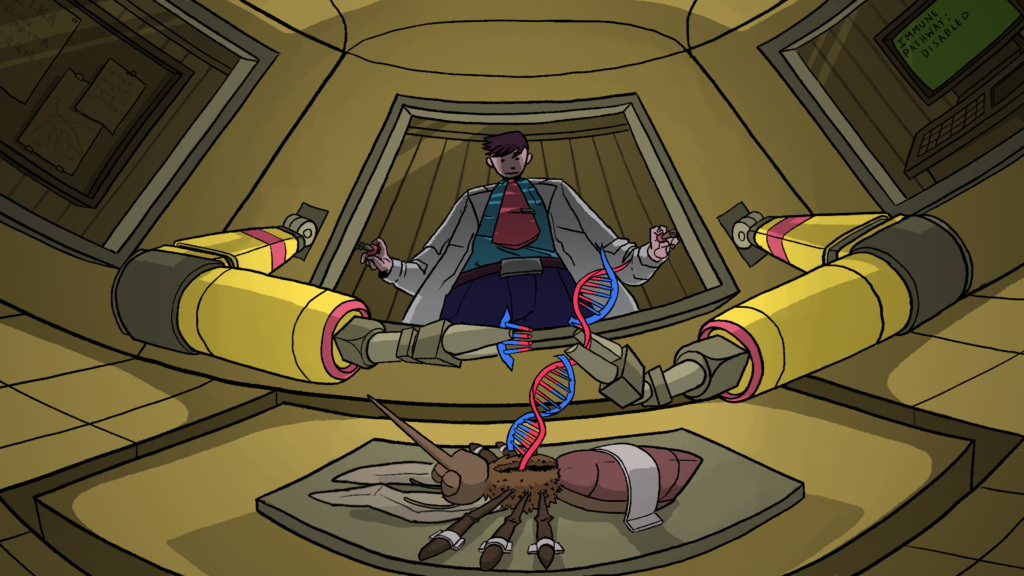Bad news for the ‘deadliest animal on the planet’: Making mosquitos vulnerable to viruses that infect humans

Immune pathways that protect mosquitoes from human pathogens, including West Nile, Zika and dengue viruses were disabled by Texas A&M AgriLife Research scientists.
The research study, “RNA interference is essential to modulating the pathogenesis of mosquito-borne viruses in the yellow fever mosquito Aedes aegypti,” published in the Proceedings of the National Academy of Sciences, showed that the mosquito vector species Aedes aegypti becomes acutely susceptible to disease when the protective immune pathway is disabled.
This discovery provides new insight into the ecological and evolutionary interactions occurring between mosquitoes and the pathogens they transmit to humans and animals.
Dr. Kevin Myles, professor in the Department of Entomology at the Texas A&M College of Agriculture and Life Sciences, said the findings could potentially be exploited to control the transmission of many different vector-borne diseases to humans and animals. Myles has been involved in related research with Dr. Zach Adelman, a professor in the department, to develop methods for genetically engineering mosquito populations. Adelman was also involved in this study.
Myles explains his research, the motivation behind his work, and the potential positive impacts it could have on human and animal health here and the world over.
How could your study impact the everyday person, community or world?
The mosquito is the deadliest animal on the planet.
One historian, Timothy Winegard, has estimated that mosquitoes have been responsible for killing nearly half of humanity during our existence on this planet. The reason for this is because mosquitoes transmit pathogens that collectively exert an enormous burden on global health due to their widespread prevalence and the severe morbidity and mortality they cause in human and animal hosts.
Addressing a problem of this magnitude, which has defied solution for so long, requires a very long-term research-based approach, which has typically been the purview of major universities. We hope that the information we have learned in this study can ultimately be used to develop new strategies for controlling mosquito-borne diseases.
Why is this research important?
Now that we know how important the mosquito’s immune response is in the transmission of viral pathogens, can we exploit that information to control disease in humans and animals? For example, in other work occurring in the laboratory, we are collaborating with George Dimopoulos’ lab at Johns Hopkins University to see if we can augment or reinforce the mosquito’s immune response to make insects that are resistant to infection with these pathogens.
We are also collaborating with Omar Akbari’s lab at the University of California at San Diego to see if we can interfere with the mosquito’s immune response so that they develop disease when infected with these pathogens.
Finally, we are collaborating with Adelman’s lab here in the department to develop novel gene drive strategies for genetically modifying mosquito populations.
How will this advance the understanding of mosquitoes and vector-borne diseases?
Although we have known that mosquitoes transmit deadly human diseases for more than 100 years now, it was not understood why the mosquitoes themselves don’t develop any overt disease when infected with these same pathogens.
This research demonstrates that it is the mosquito’s immune response that protects them from suffering any serious harm when infected with viruses associated with human diseases.
This now raises several other interesting questions. Why is the mosquito’s immune response more effective than ours at preventing disease? If the mosquito’s immune response is able to prevent disease, then why doesn’t it always prevent transmission of these viruses to people and animals?
How is technology helping to understand mosquito biology?
In this study, we used the CRISPR/Cas9 technology, for which Jennifer Doudna and Emmanuelle Charpentier were awarded the Noble Prize in chemistry in 2020, to knock out a key gene involved in the antiviral immune response of Aedes aegypti.
Before the development of gene editing methods such as these, it would not have been possible to perform this study. The same technology has led to rapid advancements in the design and development of gene drives.
While a number of technological hurdles still remain, gene drives are currently being developed as tools with the potential to facilitate large-scale genetic engineering projects to control or modify mosquito populations. Such tools could help us translate our findings into new disease control methods; for example, by modifying the immune response of Aedes aegypti populations.

